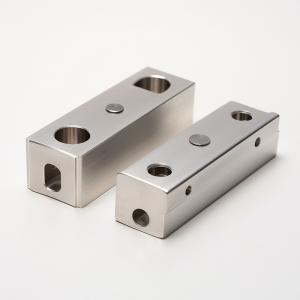
Add to Cart
Custom CNC milling offers manufacturers the ability to swiftly create CNC prototypes and robust
machined components for diverse applications. When choosing materials for CNC machining,
it's essential to note that only stainless steel provides corrosion resistance.
For lightweight products, consider low-density metals such as aluminum, beryllium, titanium,
and magnesium alloys.
CNC milling machines excel at producing highly accurate and precise prototypes quickly and
efficiently, making them an ideal choice for product development.
By utilizing computer-aided design (CAD) software to generate a 3D model of the prototype,
CNC milling machines can then fabricate a physical representation of that prototype.
This enables designers to create and evaluate a single prototype to refine and perfect their design
before proceeding to mass production.
Materials and alloys capable of withstanding high machining temperatures encompass titanium,
stainless steel, nickel, and tantalum.
Lastly, it's crucial to consider material costs for custom CNC milling projects, as these costs impact
the overall project expenses.
Product Details
Materials for CNC machining are typically classified into three major categories:
plastics, soft metals, and hard metals. Examples encompass aluminum, bronze, copper,
ceramics, plywood, steel, stone, wood, zinc, and various others.
Materials characterized by ease of manipulation and favorable properties are commonly preferred
over alternative options.
| Common Materials for CNC Machining | |
| Material | Properties |
| Aluminum | 2024: Good fatigue resistance and strength; excellent toughness at moderate to high strength levels; improved fracture toughness |
| 6061: Excellent machinability, low cost, and versatility | |
| 7075: High strength, hardness, low weight, and heat tolerance | |
| Brass | Versatile and highly attractive copper/zinc alloy with warm yellow color accommodates severe forming/drawing |
| Copper | High ductility and high electrical and thermal conductivity; develops attractive blue-green surface patina over time |
| Stainless Steel | Excellent machinability and outstanding uniformity; good workability and weldability, high ductility and formability |
| Steel Alloy | Mix of chromium, molybdenum, and manganese yields toughness, good torsional and fatigue strength |
| Steel Mild Low Carbon | High machinability and weldability, high stiffness; good mechanical properties, machinability, and weldability at low cost |
| Titanium | Excellent strength to weight ratio, used in aerospace, automotive, and medical industries |
| ABS | Excellent impact resistance, good mechanical properties, susceptible to solvents |
| Nylon | Excellent mechanical properties, high toughness, poor moisture resistance |
| POM | High stiffness, excellent thermal & electrical properties, relatively brittle |



| CNC Milling Tolerances | ||
| Limits for nominal size | Plastics | Metals |
| 0.5mm* to 3mm | ±0.1mm | ±0.05mm |
| Over 3mm to 6mm | ±0.1mm | ±0.05mm |
| Over 6mm to 30mm | ±0.2mm | ±0.10mm |
| Over 30mm to 120mm | ±0.3mm | ±0.15mm |
| Over 120mm to 400mm | ±0.5mm | ±0.20mm |
| Over 400mm to 1000mm | ±0.8mm | ±0.30mm |
| Over 1000mm to 2000mm | ±1.2mm | ±0.50mm |
| Over 2000mm to 4000mm | ±2.0mm | |
| *Please clearly indicate tolerances for nominal sizes below 0.5mm on your technical drawing. | ||
CNC Machining Applications
1. Prototypes:
CNC machining is a preferred method for creating prototypes, providing a high level of accuracy
and allowing for the testing and validation of designs.
2. Titanium Pieces:
The unique properties of titanium make it challenging to machine accurately. CNC machining
excels in creating precise titanium pieces, crucial in aerospace, medical, and other industries.
3. Woodworking:
CNC machining finds applications in woodworking, enabling the creation of intricate and finely
detailed wood products.
The accuracy of CNC machining makes it a versatile and indispensable tool across industries,
facilitating the production of high-quality and intricate components for various applications.

Company Profile


FAQ's
1. What are the minimum and maximum dimensions you can machine?
Our CNC machining services cover a range of capabilities, including CNC milling
(3-axis, 3+2-axis, and 5-axis) and turning. For 3/3+2-axis CNC milling, we can machine parts
with dimensions up to 2000 x 1500 x 200 mm (78.7 x 59.0 x 7.8 in.).
The maximum part size for 5-axis milling is 650 x 650 x 300 mm (25.5 x 25.5 x 11.8 in.).
When it comes to CNC turning, we can handle parts with a maximum diameter of 431 mm (17 in.)
and a length of 990 mm (39 in.). The recommended minimum part dimensions are around
10 x 10 x 10 mm (0.39 x 0.39 x 0.39 in.), with a minimum feature size of 0.5 mm.
Please be aware that our platform has a limitation, and the maximum size for parts is 1000 mm
(39 in.). If your project requires dimensions beyond this limit, kindly reach out to our sales team
for further assistance.
2. How Much Does CNC Machining Cost?
The cost of CNC machining a part is influenced by various factors, including:
1. Material: The choice of material significantly impacts cost. Machining materials like Inconel are
more expensive due to increased tool wear and slower cutting speeds compared to materials like
aluminum.
2. Complexity: Parts with complex features are more expensive to machine.
For instance, components with intricate surface shapes incur higher costs than those with flat surfaces.
3. Tolerances: Tight dimensional tolerance requirements contribute to higher costs.
Over-specifying tight tolerances on non-critical features can increase CNC machining expenses.
4. Surface Finish: Achieving mirror finishes demands specialized tooling and machining strategies,
prolonging machining time and elevating costs.
5. Quantity: Low-volume production is inherently costlier per part than large-volume production.
The higher fee stems from spreading initial setup and programming costs over fewer parts.
3. Dedication to Quality Assurance
Our commitment to customer trust is reflected in our rigorous adherence to proven quality
management principles. This commitment extends to enhancing customer satisfaction and
continuously improving our performance and capabilities.
With decades of experience, we meet stringent regulations and maintain PPAP compliance,
particularly in the automotive, aerospace, and medical device industries. These industries serve
as benchmarks for the quality of all products we manufacture.